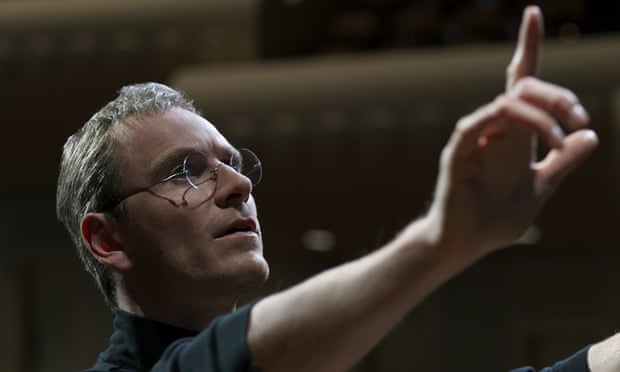The problem with Steve Jobs, Danny Boyle’s amped-up docudrama penned by Aaron Sorkin, is that despite its dizzying energy and structural idiosyncrasies, there’s not much to it. In exploring just three critical moments in the life of the eponymous Apple CEO, the film strains to squeeze as much about the man in as it can. The atypical structure – which goes from product launch to product launch to product launch, spanning 14 years – turns repetitive, and prevents the film from generating a real sense of momentum.
Steve Jobs is pure Aaron Sorkin; the film’s exterior of thunderous excitement only frames a taut behind-the-scenes narrative. Each of the three acts has Jobs (Michael Fassbender), in a panic, on the verge of unveiling his newest product – first, the Macintosh, then, the educational software NEXT, and finally, the iMac. There are technological issues, which force him to bump heads with his engineer, Andy (Michael Stuhlbarg). There’s his former partner Steve Wozniak (Seth Rogen) dumbfoundedly smiling in the background, always begging him to “mention the Apple 2 team.” (Jobs always refuses.) There’s the matter of his daughter, whom he’d initially denied ownership of, then grudgingly accepted responsibility for. Former Apple CEO John Sculley (Jeff Daniels) is around, too, asking Jobs about being adopted and later feuding with him over the future of the company. Finally, there's Joanna (Kate Winslet), Jobs' Head of Marketing and as close to a friend or confidante as he seems to have.
There are intentional redundancies in the film’s plot – Jobs always says no to Wozniak, even when it’s purely out of stubbornness; each short conversation with John better connects Jobs’ childhood to his “difficult” personality – but they still frustrate. It’s never convincing, how so many elements in Jobs’ life manage to converge in moments of utmost tension and anticipation (even if, cleverly, Sorkin alludes to this contrivance in the script). In the first act, this makes for exhilarating drama; in the second, it’s still pulling you along, but you’re wondering where it’s going. But the conclusions drawn are too broad, given the film’s narrow scope, and distressingly earnest, given how challenging the film’s depiction of Jobs is in the early-going. Steve Jobs turns increasingly uncomfortable with its erratic theatricality. It still aspires to sweeping, emotional biography, which makes for a serious discrepancy between form and intent.
The film is formally inventive and cinematically striking, but there’s a push-and-pull going on that never leaves the negotiation room. Sorkin’s talk opera often runs counter to Boyle’s encompassing vision, a friction which produces mesmerizing stuff early on but turns unfocused by midpoint. The second act concludes on a screaming match between Sculley and Jobs, and Boyle swells the score to convey a heightened importance – the content of the scene, however, is thin. It essentially amounts to a betrayal of a relationship that the film had dedicated a little over five minutes to. If well-produced, the moment is miscalculated – over-directed.
Boyle, prone to ambitious but uneven moviemaking, again works well with his actors and constructs intensely suffocating scenes. The first act is a masterclass in character study, atmospheric tension and performative realism, and Sorkin’s writing rattles brilliantly. But there’s just not much of a movie to back it all up. Sorkin’s sharp dialogue, which dominates the movie to an unusual degree – even for a Sorkin-scripted movie – struggles to escape its deliberateness, as it did so effortlessly in The Social Network and Moneyball. It feels like an exercise in writing without any discernible purpose or backbone. The same goes for Boyle’s excited direction: there are moments that land with force, but there’s a hollowness that can’t quite be compensated for.
What sticks, more than anything else, are the performances. Jobs’ storyline in this film is a little too tidy, but Fassbender is never less than riveting as the icon. He’s uncompromising and contemplative, and watching him churn through Sorkin’s monologues is a work of art on its own. The Shame star is center to every scene, and it’s a tall order that the actor pulls off with careful, measured impact. As his number two, Winslet unobtrusively disappears into her role, while Rogen, Stuhlbarg and Katherine Waterston – as the flaky mother of Jobs’ child – all do very good work in the background, with a scene or two apiece to shine. The supporting players manage to transcend a significant flaw in the writing – these characters exist solely in their relation to Jobs, but the actors dig in to find nuances and leave an impression.
Boyle’s production, in-tune with Sorkin’s writing, is theatrical – interior, verbal, a little staged. It takes place behind the scenes of a brewing revolution, and that’s a potentially fascinating conceit to work with. We meet Jobs as unflappable, egomaniacal, occasionally cruel – the picture painted, against the backdrop of innovation, is admirably uncompromising.
But Sorkin, eternal optimist he’s long proven to be, isn’t interested in living in that character space. He half-heartedly draws connecting lines between Jobs’ worst traits and his upbringing, favoring an arbitrarily redemptive tale over a more complex engagement. And then, the ending: Boyle goes full-Slumdog with the sap, earnestly pulling in each of the film’s threads to surround Jobs’ relationship with his daughter. It might not be untrue to the man’s life. But it does prove one thing. Steve Jobs’ emotional and thematic arcs end up no less standard – and, perhaps, no less didactic – than those of the biopics that it so intently works to separate from.
Grade: B-
